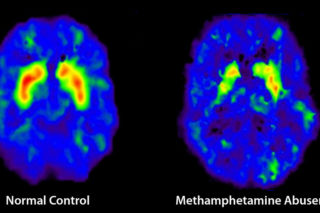Methamphetamine, also known as meth or crystal meth, is a synthetic stimulant that quickly leads to serious physical deterioration. There are a number of ways that you can take the drug. You can smoke it, inject it with a syringe, inhale or snort it, or even eat it. Like many stimulant drugs, you can get a short but super-intense “high,” with a burst of energy, when you take the drug. While the serious degenerative side effects would seem like a logical reason for avoiding further use of meth, that euphoria is enough to many users want to repeat the experience. The number of meth users is on the rise, according to the Centers for Disease Control and Prevention1https://www.cdc.gov/nchs/data/databriefs/db356-h.pdf (CDC), with two million people using meth every year. An estimated 500 people try meth every day.
Meth Sores and Other Physical Dangers of Meth Abuse – What You Should Know


But the physical side effects2https://www.drugabuse.gov/publications/drugfacts/methamphetamine are severe. It speeds up your body, so you’d see a faster heart rate, higher blood pressure and increased respiration. With short-term use, you could experience hyperthermia, convulsions, loss of appetite and an irregular heartbeat. With long-term use, you could experience sores or abscesses, paranoia, hallucination, anxiety, difficulty with concentration, memory loss, dental problems, mood swings, weight loss and even aggression.
Table of Contents
What Are Meth Sores?
Meth sores don’t sound that bad, and it’s true that meth is not the only drug that can cause you to feel itchy. The difference here is that meth use involves psychotic episodes, which can include the sensation of muscle spasms or itching. In a paranoid or hallucinogenic state, it’s possible to imagine that the itch or spasm is an insect or other object hiding under the skin, which can lead to serious scratches, gouges or cuts in an attempt to remove the hallucinogenic phantasms. What’s left after the psychotic episode has passed is a series of wounds or sores on the body, which offer telltale clues about the person’s meth addiction. These sores are not the only side effect, though. A person who is using meth and has an addiction to it will also experience severe dental problems. Since they experience such severe dry mouth, their teeth will break and literally disintegrate in their mouths. Of course, the appearance of meth sores and teeth falling out are only exacerbated by the fact that most individuals who are addicted to meth also have poor diets. They’re often drawn to high-sugar foods without proper nutrients. So, if their teeth were not bad enough before, their eating habits tend to exacerbate the physical deterioration. But those obvious outward signs of poor health and disintegration are only a piece of it. For those who have been using meth for a long period, the damage to internal organs like kidneys, the liver and the heart is extensive. If you were tracking all the things that could go wrong and are going wrong with a person’s body based on the effects of meth, it’s like a race to extinction. What will fail first: the heart, liver, kidney or a combination of everything?
What Does Withdrawal Look Like?
Meth withdrawal can vary in severity. In some cases, particularly if you haven’t been using it for very long, withdrawal can be mild and manageable. It’s still important to seek out the help and assistance of a doctor or medical provider to oversee your withdrawal and detox symptoms because the side effects could be severe and life-threatening. The most common symptoms of withdrawal include pacing, cravings, nightmares, Anhedonia and even an increased appetite. None of that sounds particularly bad or life-threatening, but severe withdrawal can take your symptoms to a whole new level, with depression, fatigue, suicidal thoughts or even an exacerbation of those psychotic thoughts and phantasms. Even when the initial symptoms have passed, it’s possible to experience more long-term and ongoing effects with headaches, pain, and even cramps. No matter how minor the withdrawal symptoms may appear to be when you first decide to start your detox, seek out medical intervention. Even if the possible side effects were not so severe, the medical detox process is the best way to monitor your vitals, administer fluids and support medications and ensure that you have a medical staff standing ready if you should experience more severe side effects.
How Does Medical Detox & Treatment Options Affect Outcomes?
Medical detox can make you more comfortable and it can also save your life if something goes wrong, but it does something else for your recovery effort. Studies show that those individuals who go through detox as part of an inpatient or outpatient treatment program are more likely to avoid relapse, especially when the treatment includes behavioral therapy3https://www.drugabuse.gov/publications/drugs-brains-behavior-science-addiction/treatment-recovery. That could involve family therapy, cognitive-behavioral therapy, motivational enhancement therapy, contingency management or even a 12-step program. The goal of these substance abuse treatments is to offer a foundation and a safe place. All the triggers and bad influences are removed. There’s typically no contact with those who are not part of the program. It’s a starting point whence a person can start to rebuild while learning to handle the stress, triggers and other external forces that may have led to or at least contributed to the current detox situation.
What Does Overdose Look Like For Meth?
Meth use is dangerous enough, but overdose is not the desired direction either. An overdose can happen at any time for a person taking meth. It’s illegal, so there’s no regulation or purification process to verify the formulation, dose or frequency. It’s like playing Russian roulette. Most users don’t have any idea what they are getting when they buy meth off the streets. In most cases, an overdose happens when a person takes a dose of meth that is just too much for the body. Even if the person took what they thought was the same dose in the past, the lack of regulation and oversight means that the dosage is not consistent, and it could be mixed with other substances, either of which could lead to an overdose. The effects of an overdose will depend on when the last dose was taken as well as what the current dosage is. The University of Arizona4http://methoide.fcm.arizona.edu/infocenter/index.cfm?stid=216 found that most overdose deaths happen because of heatstroke and its direct correlation with organ failure. Although it’s possible to experience some of the overdose symptoms with regular use, an overdose is nothing to mess with. Beyond simple agitation or anxiety, there’s the irregular heartbeat, breathing difficulties, chest pain, heart attack and even coma. We already talked about kidney damage or failure, but there’s also the possibility of hyperthermia, seizures, extreme paranoia and even a stroke. Most of the symptoms of meth overdose involve failures that could be dangerous or life-threatening either now or in the future. The most common way that an overdose happens is when a person simply takes a higher dose of meth either by accident or on purpose. Whether the overdose was accidental or truly an attempt to commit suicide, the incident could be seen as a cry for help. An overdose could very well be life threatening, so the question remains about whether it’s a suicide attempt. Not everyone appreciates being put on a psychiatric hold, but it could be the first step in detox and recovery, which could end up saving your life. It’s not every day that you’re forced to take a long, hard look at your life and realize what the overdose could have meant if it had just gone wrong.
What Does Treatment Look Like For Meth?
The Food and Drug Administration has not approved any medication to treat the symptoms and side effects of meth specifically. Your doctor or medical provider might treat the symptoms that you’re experiencing as you cope with the effects of withdrawal. So, they might prescribe medications like Modafinil for sleepiness. They might prescribe Naltrexone to treat dependence and pain. They also may prescribe Bupropion to help you cope with the depression and cravings. While treating the symptoms of Meth overdose and withdrawal can be effective, it can be a particularly dangerous time as well. If a person has been taking meth and then goes through treatment, they are at even greater risk to themselves if relapse were to occur at this most critical juncture. While the person had built up a tolerance for meth, going through treatment means that they no longer have that tolerance. So, relapse can immediately lead to overdose.
What Sets Windward Way Recovery Apart?
At Windward Way Recovery, we are dedicated to working with you to support your recovery needs, with experience and knowledge that informs how we treat your addiction to meth. Since meth is a stimulant, we carefully consider your treatment plan, based on our assessment of your physical and psychological needs. We offer a guide to meth psychosis, helping you determine the best path forward for your health and wellness needs. We offer a range of service options, including early intervention, outpatient services, intensive outpatient/partial hospitalization and residential/inpatient. Each level of care is designed to support your substance abuse recovery, specifically addressing your meth addiction with options that are well-suited for the support you will need from us and from your family and friends. We know that each patient will be affected by addiction and substance abuse in slightly different ways, so we work to craft a treatment plan that will best meet your needs for recovery while keeping your long-term sobriety in mind. That’s why our treatment options are so custom for you. Call us today to learn more about the comprehensive services we offer at Windward Way Recovery. Set up an assessment to find out how we can start you on your path to recovery from meth use and abuse.
Call Windward Way Recovery at (855) 491-7694 to Schedule Your Assessment Today!
- 1https://www.cdc.gov/nchs/data/databriefs/db356-h.pdf
- 2https://www.drugabuse.gov/publications/drugfacts/methamphetamine
- 3https://www.drugabuse.gov/publications/drugs-brains-behavior-science-addiction/treatment-recovery
- 4http://methoide.fcm.arizona.edu/infocenter/index.cfm?stid=216




